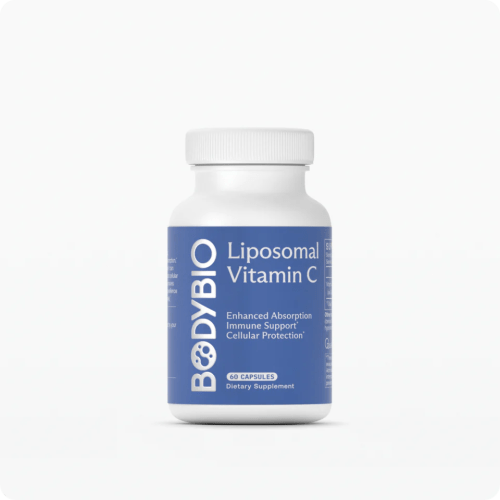Our editors independently select these products. Making a purchase through our links may earn Well+Good a commission
Whether prepping for travel, feeling the first tickles of a sore throat, or recovering from a challenging week, vitamin C-rich supplements or foods are commonly turned to for extra support. However, this vitamin does far more for the body than just promote immunity and should be prioritized every single day. “Plus, since humans are unable to synthesize vitamin C, it is an essential nutrient that must be obtained through food [or supplements],” adds Violeta Morris, MS, RDN, dietitian and founder of The Concierge Dietitian, only furthering this notion. Ready to up your vitamin C intake? Keep on reading.
Experts in This Article
MS, RDN, dietitian and founder of The Concierge Dietitian
How Vitamin C Benefits Your Health
First things first, what exactly is vitamin C?
“Vitamin C, also known as ascorbic acid or ascorbate, is a water-soluble vitamin,” explains Morris. This micronutrient carries out a range of vital roles throughout the body, most notably immune function.
“It is a powerful antioxidant that protects the body from oxidative stress. Scientific research has shown that it can also regenerate other antioxidants in the body, further enhancing its protective effects,” says Morris. Oxidative compounds, also known as free radical molecules, are at the root of many acute and chronic illnesses, which is why antioxidants like vitamin C are so crucial for immune health.
For the beauty girlies out there, vitamin C is also required for collagen synthesis. This bodes well not only for glowing skin but also for wound and tissue healing body-wide. “Additionally, it supports the formation of L-carnitine, which aids in energy production and influences the production and regulation of neurotransmitters,” Morris adds. This neurotransmitter regulation may result in improved mood, cognition, and focus. Plus, vitamin C plays a critical role in iron absorption—game-changing for those with (or trying to prevent) certain types of anemia.
According to the National Institutes of Health, women over the age of 19 require 75 milligrams (mg) per day of the micronutrient, and men need 90 mg. “It’s important to note that these recommendations increase by 10 to 45 mg daily for smokers and for women who are pregnant or breastfeeding,” Morris shares.
7 Ways to Get More Vitamin C Into Your Diet
Research shows that vitamin C deficiency is somewhat common across the U.S. Thankfully, this is easily preventable through focusing on high vitamin C foods, or a well-made supplement if needed. Here are seven of the best ways to meet your daily vitamin C quota.
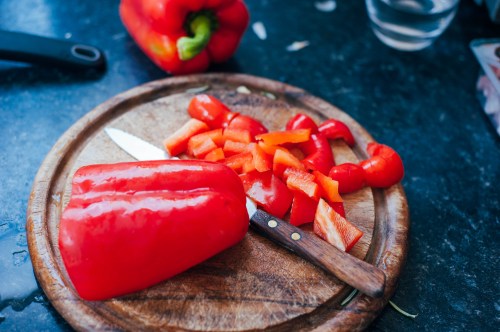
1. Red Bell Pepper
If the flavor and crunch of a fresh red bell pepper doesn’t capture you, its impressive vitamin C content certainly will. “A ½ cup of raw, sweet red pepper contains 95 mg of vitamin C per serving, which exceeds the daily recommended value for all adults,” says Morris. But the notable benefits of these peppers don’t stop there. “These amazing vegetables are packed with antioxidants, and scientific research has shown that they may help prevent cancer and support heart and brain health by slowing tumor growth and protecting cells,” Morris adds. These peppers are perfect in a morning scramble, stir fry, salad, tacos, grilled skewers, or stuffed to the brim with veggies, lean meats, and whole grains.
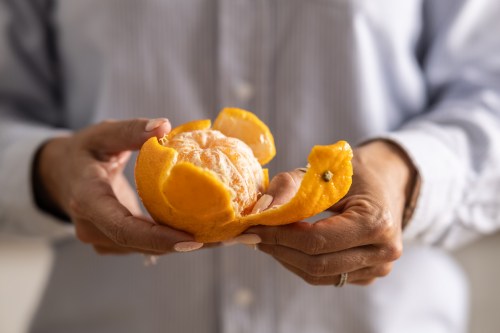
2. Oranges
Most people are aware that citrus fruits, oranges included, are excellent sources of vitamin C…but just how much are we talking? One medium orange boasts approximately 70 mg of the nutrient, whereas 12 ounces of orange juice contains around 107 mg. However, when given the option, it’s always best to choose the whole fruit. “Orange juice has significantly more sugar and less fiber than a fresh orange,” Morris explains. This means that you’ll feel a more pronounced spike (and subsequent crash) in energy levels after drinking OJ compared to the sustained energy from noshing on an orange. If not enjoyed as is, orange segments are a delicious addition to salads, yogurt, cottage cheese, smoothies, and infused waters. Freshly squeezed orange is also a tasty addition to marinades, sauces, and dressings!
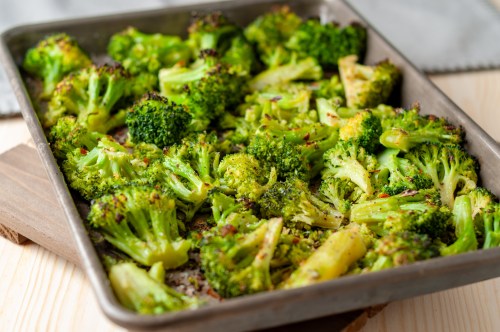
3. Broccoli
As an unsuspecting source of the micronutrient, broccoli contains a noteworthy 51 mg of vitamin C in just a half cup cooked. But that’s just the tip of the iceberg when it comes to this cruciferous veggie’s stellar nutrition. “It is also rich in fiber, vitamin K, potassium, folate, antioxidants, and natural compounds such as glucosinolates, sulforaphane, and indole-3-carbinol, which help protect our cells and may even aid in cancer prevention,” says Morris. These nutrients also combine to promote gut, heart, metabolic, and immune health. This veggie is nothing short of *chef’s kiss* when roasted, sautéed, or added to stir fries, soups, pastas, pizzas, salads, and omelettes.
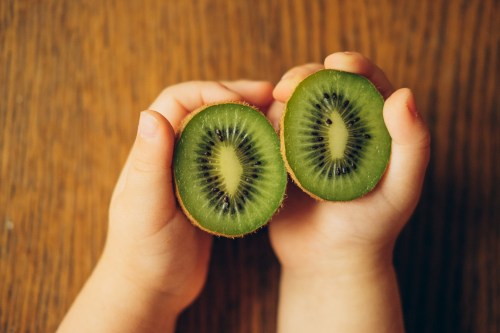
4. Kiwi
“A medium kiwifruit contains about 64 mg of vitamin C, which supports a healthy immune system and helps maintain skin health by protecting the body from the sun's radiation. It also has anti-aging effects by promoting collagen production, a protein that helps keep skin firm and soft,” Morris explains. Plus, its sweet yet tart flavor is nothing short of addictive. This furry green fruit is perfectly delicious straight from the skin as well as added to smoothies, chia pudding, yogurt, or cottage cheese.
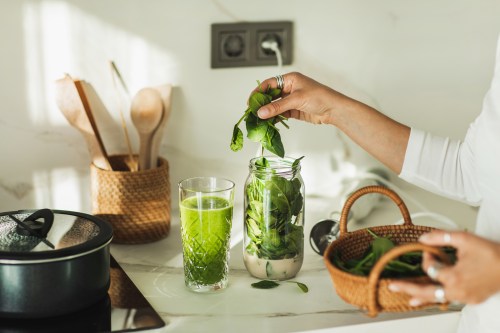
5. Spinach
Aside from its notable iron, vitamin A, vitamin K, folate, potassium, fiber, and plant compound content, spinach is a fantastic way to work towards your daily vitamin C goals with 30 mg per 3.5 ounces. This amount is equal to around half a cup uncooked…and many of us eat way more than that at one time. This bona fide superfood supports optimal eye, heart, immune, bone, and gut health, too. Wilt it with garlic and a little lemon as a side dish, add it to smoothies, eggs, pastas, soups, stir fries, or fried rice, or eat it raw by the handful.
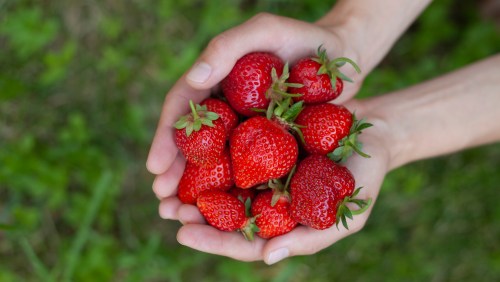
6. Strawberries
If you’re not prepared to throw down 20 dollars for the most perfect social media-worthy strawberry, equally delicious (and less expensive) local options will soon be available as strawberry season quickly approaches. Their candy-like taste is a major selling point as is, but these berries also have plenty of notable nutrition to further sweeten the deal. “In just ½ cup of sliced fresh strawberries, an adult can get about half of the recommended daily amount of vitamin C, providing 54 mg per serving,” says Morris. Strawberries are also packed with fiber and plant compounds like anthocyanins. “Anthocyanins help reduce inflammation, fight harmful particles, and support brain and heart health,” Morris adds. Whether included in your smoothie, yogurt, cereal, baked goods, or salads, these popular fruits are sure to satisfy.

7. Dietary Supplements
And if you aren’t a fan of any of these high vitamin C foods or still struggle to get enough daily for any reason, a dietary supplement can be an effective alternative. “I always recommend a food-first approach, but if a supplement is needed, try to choose one that’s ascorbic acid-based (the most absorbable form of vitamin C), sticks close to the daily intake recommendations, and is third-party tested without unnecessary fillers or sugars,” says Taylor McClelland Newman, MS, RD, LD, owner and dietitian at Nourished By Taylor, LLC. This Liposomal Vitamin C from BodyBio meets all of these criteria, as an ascorbic acid-based, liposomal encapsulated product, features that significantly increase bioavailability and absorption potential. “However, vitamin C supplements can interact with certain medications, so it's best to check with your physician before starting a supplement,” Newman adds.
Sponsored by BodyBio
Sign Up for Our Daily Newsletter
Get all the latest in wellness, trends, food, fitness, beauty, and more delivered right to your inbox.
Got it, you've been added to our email list.







